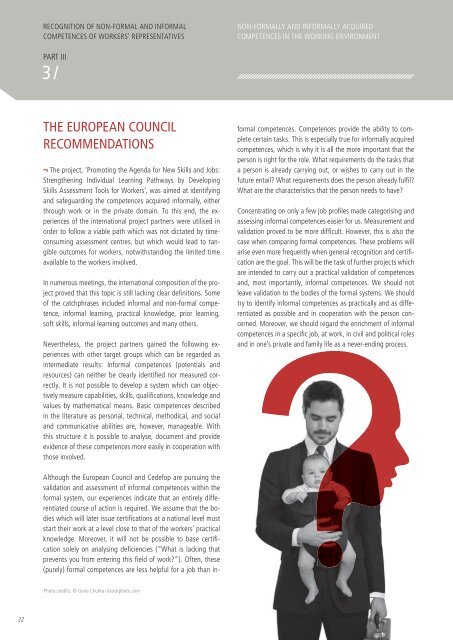RECOGNITION OF NON-FORMAL AND INFORMAL ... - Solidar
RECOGNITION OF NON-FORMAL AND INFORMAL ... - Solidar
RECOGNITION OF NON-FORMAL AND INFORMAL ... - Solidar
Create successful ePaper yourself
Turn your PDF publications into a flip-book with our unique Google optimized e-Paper software.
<strong>RECOGNITION</strong> <strong>OF</strong> <strong>NON</strong>-<strong>FORMAL</strong> <strong>AND</strong> IN<strong>FORMAL</strong><br />
COMPETENCES <strong>OF</strong> WORKERS’ REPRESENTATIVES<br />
<strong>NON</strong>-<strong>FORMAL</strong>LY <strong>AND</strong> IN<strong>FORMAL</strong>LY ACQUIRED<br />
COMPETENCES IN THE WORKING ENVIRONMENT<br />
PART III<br />
3 /<br />
THE EUROPEAN COUNCIL<br />
RECOMMENDATIONS<br />
¬ The project, ‘Promoting the Agenda for New Skills and Jobs:<br />
Strengthening Individual Learning Pathways by Developing<br />
Skills Assessment Tools for Workers’, was aimed at identifying<br />
and safeguarding the competences acquired informally, either<br />
through work or in the private domain. To this end, the experiences<br />
of the international project partners were utilised in<br />
order to follow a viable path which was not dictated by timeconsuming<br />
assessment centres, but which would lead to tangible<br />
outcomes for workers, notwithstanding the limited time<br />
available to the workers involved.<br />
In numerous meetings, the international composition of the project<br />
proved that this topic is still lacking clear defi nitions. Some<br />
of the catchphrases included informal and non-formal competence,<br />
informal learning, practical knowledge, prior learning,<br />
soft skills, informal learning outcomes and many others.<br />
Nevertheless, the project partners gained the following experiences<br />
with other target groups which can be regarded as<br />
intermediate results: Informal competences (potentials and<br />
resources) can neither be clearly identifi ed nor measured correctly.<br />
It is not possible to develop a system which can objectively<br />
measure capabilities, skills, qualifi cations, knowledge and<br />
values by mathematical means. Basic competences described<br />
in the literature as personal, technical, methodical, and social<br />
and communicative abilities are, however, manageable. With<br />
this structure it is possible to analyse, document and provide<br />
evidence of these competences more easily in cooperation with<br />
those involved.<br />
formal competences. Competences provide the ability to complete<br />
certain tasks. This is especially true for informally acquired<br />
competences, which is why it is all the more important that the<br />
person is right for the role. What requirements do the tasks that<br />
a person is already carrying out, or wishes to carry out in the<br />
future entail? What requirements does the person already fulfi l?<br />
What are the characteristics that the person needs to have?<br />
Concentrating on only a few job profi les made categorising and<br />
assessing informal competences easier for us. Measurement and<br />
validation proved to be more diffi cult. However, this is also the<br />
case when comparing formal competences. These problems will<br />
arise even more frequently when general recognition and certifi -<br />
cation are the goal. This will be the task of further projects which<br />
are intended to carry out a practical validation of competences<br />
and, most importantly, informal competences. We should not<br />
leave validation to the bodies of the formal systems. We should<br />
try to identify informal competences as practically and as differentiated<br />
as possible and in cooperation with the person concerned.<br />
Moreover, we should regard the enrichment of informal<br />
competences in a specifi c job, at work, in civil and political roles<br />
and in one‘s private and family life as a never-ending process.<br />
Although the European Council and Cedefop are pursuing the<br />
validation and assessment of informal competences within the<br />
formal system, our experiences indicate that an entirely differentiated<br />
course of action is required. We assume that the bodies<br />
which will later issue certifi cations at a national level must<br />
start their work at a level close to that of the workers’ practical<br />
knowledge. Moreover, it will not be possible to base certifi -<br />
cation solely on analysing defi ciencies (“What is lacking that<br />
prevents you from entering this fi eld of work?”). Often, these<br />
(purely) formal competences are less helpful for a job than in-<br />
Photo credits: © Gene Chutka / istockphoto.com<br />
22
















